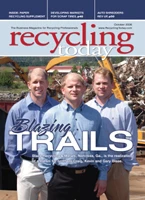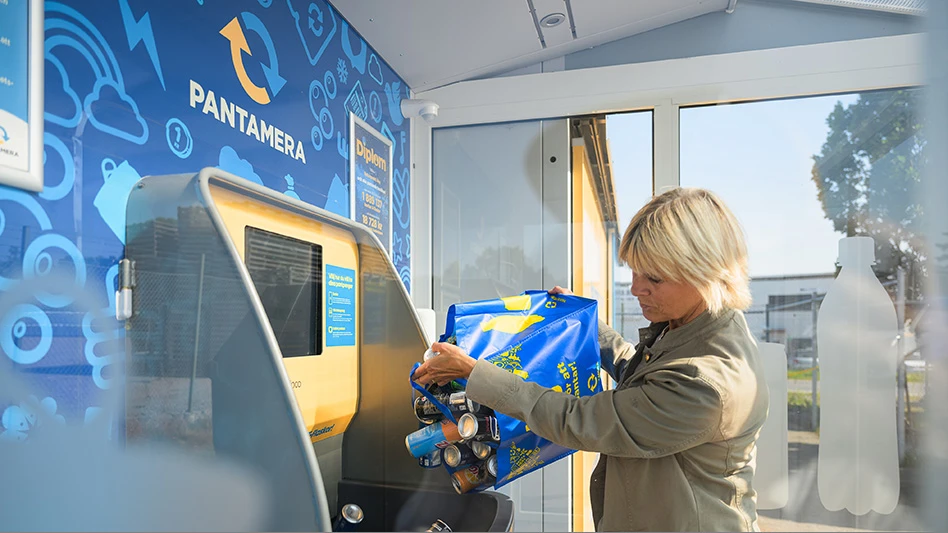
In a business dominated by heavy equipment, one of the
most vital tools used by today’s recyclers might be hard to
spot. It may lack the raw physical power of a scrap shear
or the stature of an auto shredder, but software is something many recyclers today can’t do without.
As the industry has become more sophisticated, many recyclers rely on custom software packages to manage their inventory, sales and accounting more efficiently. However, like any major equipment investment, recyclers have a lot to consider when purchasing software.
A JOINT DECISION. A primary decision recyclers have to make when choosing what kind of software is the best match for their particular operations is whether to use separate inventory, sales and accounting software or a combination package.
The software American Compressed Steel in Kansas City, Mo., uses is a package from Shared Logic, a software provider based in Holland, Ohio. "It’s always been an integrated package," says Allan Ross, vice president of American Compressed Steel. "We have a payroll module, scale, inventory, everything. It all flows to the general ledger, which is the biggest advantage."
Mark Weis of Wimco Metals in Pittsburgh opted for a different software route. The package he uses from RECY Systems North America, Collegeville, Pa., offers separate operational and accounting software. However, Weis says the software systems are so well interfaced that they work practically like a combined package.
The Recycling Operations Manager (ROM) software from 21st Century Programming, Long Beach, Calif., used at Cherry City Metals in Salem, Ore., is also separate from the company’s accounting software, according to Assistant Manager Jennifer Nicoli. However, she says the system transfers information easily from ROM to the company’s accounting software.
As long as information is readily sharable between programs, separate software can work just as well as a combined configuration. The choice primarily depends on each individual company’s size, needs and preferences. For example, in Cherry City Metals’ case, most of the accounting is done outside the company, so Cherry City wanted recycling software that would work with the accounting system it already had in place, Nicoli says.
Software is an evolving tool, offering new versions to help recyclers better run their businesses. As with any piece of equipment, recyclers might be interested in new models as their operations grow and change.
MOVING UP. Upgrades are a given for software users. Many recyclers who have been using software since the mid-’90s have gone through numerous upgrades over the years. Both the information technology industry and the recycling world itself can offer cues that tell recyclers it’s time to upgrade.
Ross says it’s important to make sure a software provider follows where the information industry is going when it comes to upgrading software. He says American Compressed Steel has used Shared Logic since 1993 and that its first major upgrade took place when the company designed its programs to work with Microsoft Windows.
"We were originally in the old environment, but the world was changing to Windows, so that’s what we did, too," says Ross. "Everything was shifting that way."
Changes in the recycling markets can also dictate when to consider an upgrade, says Weis. He says new versions of the RECY software used at Wimco Metals incorporate tracking containers and making bills for overseas shipments—issues that have become more important as more companies eye lucrative opportunities overseas.
Current industry issues also signaled the need for an upgrade at Cherry City Metals. The company’s most recent upgrade involves addressing the growing problem of scrap theft as nonferrous metal prices skyrocket. According to Nicoli, city rules require Cherry City Metals to record identification with each nonferrous sale. "So we’ve upgraded our system to allow us to scan [driver’s] licenses," she says. This software upgrade replaces Cherry City Metals’ old system of photocopying licenses and attaching the copies to each receipt, a practice Nicoli admits was far from efficient.
When starting up a software program, be it a new package or an upgrade, the process can be daunting and usually requires a great deal of preparation before the system goes live. Each company has to consider its own operations and decide how to best approach the switch, says Weis. One strategy to prepare for a switch is to run the old and new system parallel before completely switching over. This was the approach Weis took. "It depends what you want—as a conservative company, we wanted to run parallel," he says. "It’s not an easy task—you’re doing double work." However, Weis says he feels the extra workload is worth it. "I do recommend at least one month of running parallel," he says. He suggests that after adding or upgrading software, recyclers close out a month to be certain that the system works properly.
Nicoli says since her company went directly from a paper-based system to software use, Cherry City Metals didn’t opt for a parallel trial run. She says recyclers should prepare for a hectic first few weeks whenever implementing a new program. "In the beginning, when you go live with something brand new to you, the first month or two is just chaos," she says. "You have to be patient and you have to figure out how to accommodate [the software] best to your company."
This makes a software provider’s reputation for follow-up and service a key element in a recycler’s software search, Nicoli says.
Sponsored Content
Labor that Works
With 25 years of experience, Leadpoint delivers cost-effective workforce solutions tailored to your needs. We handle the recruiting, hiring, training, and onboarding to deliver stable, productive, and safety-focused teams. Our commitment to safety and quality ensures peace of mind with a reliable workforce that helps you achieve your goals.
ON-CALL. The availability of support once the software goes live is also an important factor for recyclers to consider, possibly one of the most important, agrees Weis.
"Technical support is huge when evaluating what software to run," he says. "There are a lot of scrap metal software [companies] out there—you have to take a look at the technical support."
Price is also something to consider, although Weis warns against choosing a provider on dollar amount alone. "Don’t shortchange yourself for a few thousand dollars," he says. "Spend some money upfront to save yourself money down the road."
Ross says that when it comes to the software itself, recyclers should keep their employees in mind. "My biggest thing is ease of use for the actual users," he says. "The end user is who you really have to be thinking about—the person who’s running the scale. It has to be easy for him to use."
But above all, Nicoli says recyclers should make sure they find a provider that will commit to working with them. "It’s important that you find a software company that won’t just install their system and walk away," she says.
The author is associate editor of Recycling Today and can be contacted at jgubeno@gie.net.
Get curated news on YOUR industry.
Enter your email to receive our newsletters.

Explore the October 2006 Issue
Check out more from this issue and find your next story to read.
Latest from Recycling Today
- Nucor expects slimmer profits in early 2025
- CP Group announces new senior vice president
- APR publishes Design Guide in French
- AmSty recorded first sales of PolyRenew Styrene in 2024
- PRE says EU’s plastic recycling industry at a breaking point
- Call2Recycle Canada, Staples Professional expand partnership
- Circular Services breaks ground on north Texas MRF
- Tariff uncertainty results in choppy nonferrous scrap flows







